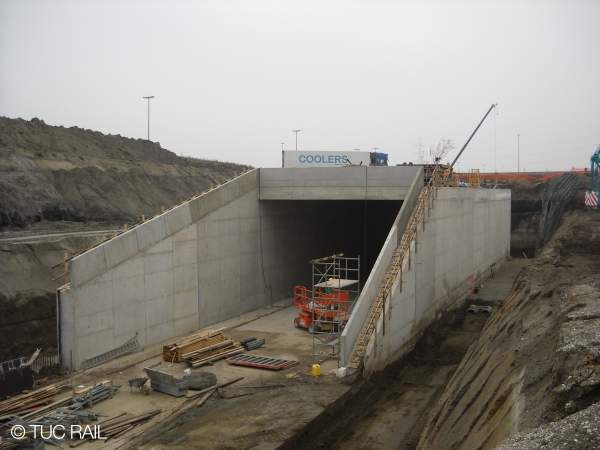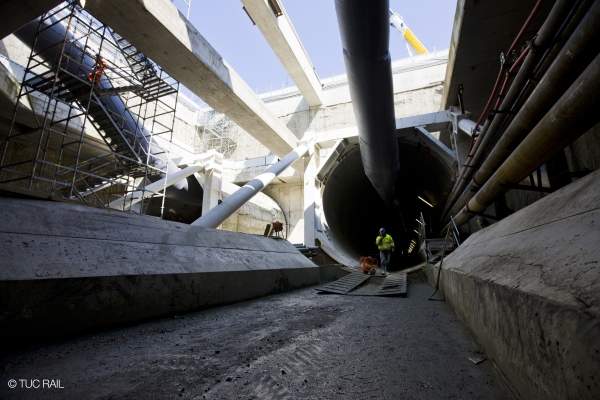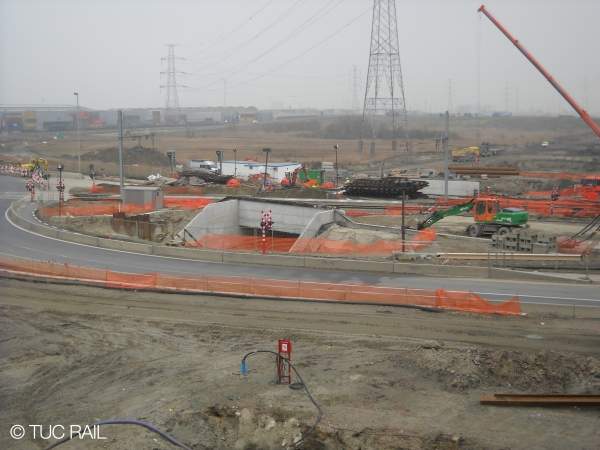The Liefkenshoek rail link is a 16.2km dual railway constructed in Antwerp, Belgium. The freight-only railway line directly connects the eastern and western docks of the Escaut river and link Bundel Zuid with the Antwerp North marshalling yard. It runs under the Kanaal dock, the Schelde River and Waasland canal.
The Port of Antwerp handles about 30 million tons of cargo a year with more than 250 trains operating from the port area. The new Liefkenshoek railway line relieves the increasing traffic congestion of goods and serves as an alternative to the roadways.
The railway infrastructure also reduced the travelling distance by 22km and operational costs.
Involving an €840m investment, the rail link is the largest infrastructure development project in Belgium. Belgian railway operator Infrabel built the line through a public-private-partnership (PPP).
Construction started in November 2008 and was completed in August 2013. It was followed by the laying of the railway tracks, overhead wiring and signalling infrastructure by Infrabel.
After testing the railway line, the first freight train transported goods from the left bank to the right bank of the Scheldt River in December 2014.
Liefkenshoek line details
The Liefkenshoek project included an embankment of 4.8km, building infrastructure in an open and covered trench along 4.2km, reopening an existing 1.2km-long Beveren Tunnel and the boring of two 6km-long tunnels.
The line passes underwater through the existing Beveren tunnel of the Waasland canal on the left bank, and the Scheldt River and Kanaaldok B1-B2 on the right bank.
Infrastructure of the rail link
The two tunnels, running parallel to each other, have an internal diameter of 7.3m. They have 13 cross passages and eight evacuation shafts at distances of about 300m.
Five cross passages were built at a 250m gap below the Schelde River. The tunnels have fire-protection and smoke-control systems.
The project also included the construction of two culverts, four road crossings and an aqueduct. Three noise buffers, noise screens and a compensation area were also built to integrate the railway infrastructure with the surroundings.
Tunnel construction
Herrenknecht provided two pressure-balance tunnel boring machines (TBMs) for the project. The high-pressurised water Mixshield TBMs are 8.4m in diameter and 102m-long.
The north TBM, named Schanulleke, was launched in February 2010, while the south TBM Wiske was launched after a month. The first tunnel was completed in May 2011 and the second in August 2011.
The critical phases of tunnelling were boring underwater of channel dock B1-B2 and Scheldt. A 2m thick concrete plate was installed in the channel dock above a deposition of 30,000m³ concrete.
The installation was completed using floating pontoons and divers. The entire tunnel boring was completed using computer and laser technology.
The entire project required about 400,000m³ of in-situ concrete and 40,000t of reinforced steelwork.
Contractors involved in the Liefkenshoek rail link project
The Liefkenshoek Rail Link project is the largest PPP project in Belgium.
The 42-year, €840 design, build, finance and maintain (DBFM) contract was awarded to Locorail Consortium comprising Vinci Concessions (25%), CFE (25%) and BAM PPP (50%) in November 2008.
Locorail appointed THV LocoBouw, a consortium of CEI-De Meyer, VINCI Construction Grands Projets, Wayess & Freytag, CEI-De Meyer and MBG (a subsidiary of CFE), for the construction.
The contractors are also responsible for the maintenance of the railway infrastructure and the electromechanical installations until 2051, after which the ownership will be transferred to Infrabel.
Smet Aannemingen was contracted for evacuation of the excavated materials. ArcelorMittal Projects provided the steel foundation solutions for the tunnels construction.
The project was supervised by TUC Rail, the technology consultant of Infrabel.
Financing the construction
Financing for Locorail was provided by the European Investment Bank and a consortium of six banks. The technical advisor to the lending banks is MottMacDonald. Deloitte is the financial consultant for the project. Stratec is the traffic consultant and Allen & Overy is the legal consultant.
Infrabel has invested €75m. The PPP consortium was eligible for a subsidy of €107m from the Flemish Government.




